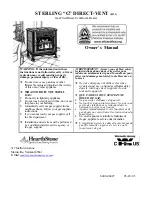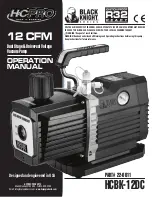
13
4. When installing multiple water heaters in the same gas supply
system it is recommended that individual positive lock-up gas
pressure regulators be installed at each unit.
power supply
The water heaters covered in this manual require a 120 VAC,
1Ø (single phase), 60Hz, 15 amp power supply and must also
be electrically grounded in accordance with local codes or, in the
absence of local codes, with the National electrical Code, ANSI/
NFPA 70 or the Canadian electrical Code, CSA C22.1.
water temperature control and miXing ValVes
Water temperature over 125°F (52°C)
can cause severe burns instantly
resulting in severe injury or death.
Children, the elderly and the
physically or mentally disabled are at
highest risk for scald injury.
Feel water before bathing or showering.
Temperature limiting devices such as
mixing valves must be installed
when required by codes and to
ensure safe temperatures at fixtures.
Water heated to a temperature which will satisfy clothes washing, dish
washing, and other sanitizing needs can scald and cause permanent
injury upon contact. Short repeated heating cycles caused by small
hot water uses can cause temperatures at the point of use to exceed
the water heater’s temperature setting by up to 20°F (11°C).
Some people are more likely to be permanently injured by hot water
than others. These include the elderly, children, the infirm and the
physically/mentally disabled. Table 5 shows approximate time-to-burn
relationship for normal adult skin. If anyone using hot water provided
by the water heater being installed fits into one of these groups or if
there is a local code or state law requiring a certain water temperature
at the point of use, then special precautions must be taken.
In addition to using the lowest possible temperature setting that
satisfies the demand of the application a mixing Valve should be
installed at the water heater (see Figure 10) or at the hot water taps
to further reduce system water temperature.
mixing valves are available at plumbing supply stores. Consult a
qualified Installer or Service Agency. Follow mixing valve manufacturer’s
instructions for installation of the valves.
table 5.
Water Temperature °F
Time for 1st Degree Burn
(less Severe Burns)
Time for Permanent Burns
2nd & 3rd Degree
(most Severe Burns)
110
(normal shower temp.)
116
(pain threshold)
116
35 minutes
45 minutes
122
1 minute
5 minutes
131
5 seconds
25 seconds
140
2 seconds
5 seconds
149
1 second
2 seconds
154
instantaneous
1 second
(u.S. Government memorandum, C.P.S.C., Peter l. Armstrong, Sept. 15,1978)
gas supply systems
low pressure building gas supply systems are defined as those
systems that cannot under any circumstances exceed 14”
W.C. (1/2 PSI Gauge). These systems do not require pressure
regulation. measurements should be taken to insure that gas
pressures are stable and fall within the requirements stated on
the water heater rating plate. readings should be taken with
all gas burning equipment off (static pressure) and with all gas
burning equipment running at maximum rate (dynamic pressure).
The gas supply pressure must be stable within 1.5” W.C.
from static to dynamic pressure to provide good performance.
Pressure drops that exceed 1.5” W.C. may cause rough starting,
noisy combustion or nuisance outages. Increases or spikes
in static pressure during off cycles may cause failure to ignite
or in severe cases damage to appliance gas valves. If your
low pressure system does NOT meet these requirements, the
installer is responsible for the corrections.
High Pressure building supply systems use pressures that exceed
14” W.C. (1/2 PSI Gauge). These systems must use field supplied
regulators to lower the gas pressure to less than 14” W.C. (1/2
PSI Gauge). Water heaters require gas regulators that are properly
sized for the water heater input and deliver the rating plate specified
pressures. Gas supply systems where pressure exceeds 5 PSI
often require multiple regulators to achieve desired pressures.
Systems in excess of 5 PSI building pressure should be designed
by gas delivery professionals for best performance. Water heaters
connected to gas supply systems that exceed 14” W.C. (1/2 PSI
Gauge) at any time must be equipped with a gas supply regulator.
All models require a minimum gas supply pressure of 4.5" W.C.
for natural gas and propane gas. The minimum supply pressure
is measured while gas is flowing (dynamic pressure). The supply
pressure should never fall below 4.5" W.C. for natural gas and
propane gas. The supply pressure should be measured with all
gas fired appliances connected to the common main firing at full
capacity. If the supply pressure drops more than 1.5” W.C. as gas
begins to flow to the water heater then the supply gas system
including the gas line and/or the gas regulator may be restricted
or undersized. See Supply Gas regulator section and Gas Piping
section of this manual. The gas valve on all models has a maximum
gas supply pressure limit of 14” W.C. The maximum supply pressure
is measured while gas is not flowing (static pressure).
supply gas regulator
The maximum allowable gas supply pressure for this water heater is
14
" W.C. (3.48 kPa). Install a positive lock-up gas pressure regulator
in the gas supply line if inlet gas pressure can exceed 14" W.C.
(3.48 kPa) at any time. regulators must be sized/used according to
manufacturer’s specifications. Supply gas regulators shall have inlet
and outlet connections not less than the minimum supply gas line
size for the water heater they supply.
If a positive lock-up regulator is required follow these instructions:
1. Positive lock-up gas pressure regulators must be rated at or above
the input Btu/hr rating of the water heater they supply.
2. Positive lock-up gas pressure regulator(s) should be installed no closer
than 3 equivalent feet (1 meter) and no farther than 8 equivalent
feet (2.4 meters) from water heater’s inlet gas connection.
3. After installing the positive lock-up gas pressure regulator(s), an
initial nominal supply pressure setting of 7" W.C. (1.74 kPa) while
water heater is operating is recommended and will generally
provide good water heater operation. Some additional adjustment
maybe required later to maintain a steady gas supply pressure.
installation reQuirements
Summary of Contents for GPG 81-140
Page 25: ...25 LIGHTING OPERATION LABEL Figure 21 Label for Natural AND LP Gas Models ...
Page 53: ...notes 53 ...
Page 54: ...notes 54 ...














































